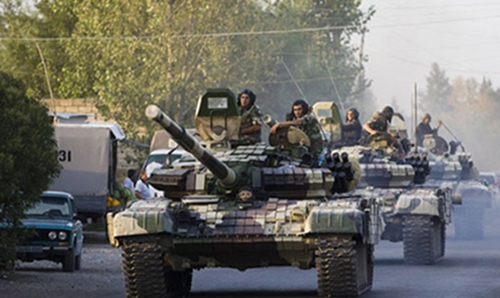Azerbaijan announces Nagorny Karabakh 'ceasefire' amidst clashes
Yerawan: Azerbaijan on Sunday announced a unilateral ceasefire after the worst outbreak of violence in decades over the disputed Nagorny Karabakh region, but Armenian forces insisted clashes were continuing despite international pressure to stop the fighting.
The defence ministry in Baku said "Azerbaijan, showing good will, has decided to unilaterally cease hostilities", but threatened to strike back if its forces came under attack.
Baku also pledged to "reinforce" several strategic positions it claimed to have "liberated" inside the Armenian-controlled region, which is internationally recognised as part of Azerbaijan.
The Armenian-backed separatist defence ministry in Karabakh -- which claims independence but is heavily backed by Yerevan -- said they were willing to discuss a ceasefire but only if it saw them regain their territory.
A spokesman for the Karabakh presidency, David Babayan, told AFP that fighting had not halted along the frontline.
"Fierce fighting is under way on southeastern and northeastern sectors of the Karabakh frontline," he said.
Armenian defence ministry spokesman Artsrun Hovhannisyan also dismissed the Azeri ceasefire claim as a "trap that does not mean a truce".
An AFP photographer in the Azerbaijani town of Terter -- some ten kilometres from the frontline -- reported hearing sporadic shooting Sunday afternoon.
Men carried a coffin draped in Azerbaijan's flag through the streets as the funeral of an Azeri soldier killed in the clashes was held. At least three houses were destroyed by shelling and women and children had been evacuated.
Fierce clashes left at least 18 Armenian and 12 Azerbaijani soldiers dead Saturday after the two sides accused each other of attacking with heavy weaponry across the volatile frontline.
The Karabakh authorities said one boy was killed in the fighting, while Azerbaijan said two civilians died and ten were wounded.
Armenia's President Serzh Sarkisian called the clashes the "largest-scale hostilities" since a 1994 truce ended a war in which Armenian-backed fighters seized the territory from Azerbaijan.
Azerbaijan said one of its helicopters was shot down as its forces took control of several strategic heights and a village in Armenian-controlled territory.
Karabakh forces on Sunday claimed they took back the strategic Lala-Tepe height in Karabakh which was captured by Azeri troops on Saturday.
Baku denied the report, saying that the height remained under its control and that rebel troops sustained "serious manpower losses".
- Appeals for calm -
Both Russia and the West appealed to all sides to show restraint, with key regional power broker President Vladimir Putin calling for an "immediate ceasefire".
Moscow has supplied weaponry to both sides in the conflict, but has much closer military and economic ties to Armenia and Yerevan is reliant on Russia's backing.
US Secretary of State John Kerry urged the arch foes to return to peace talks under the auspices of the Organisation for Security and Cooperation in Europe (OSCE), reiterating "there is no military solution to the conflict".
Turkish President Recep Tayyip Erdogan meanwhile vowed to back traditional ally Azerbaijan "to the end" in the conflict.
"We pray our Azerbaijani brothers will prevail in these clashes with the least casualties," Erdogan said.
Ethnic Armenian separatists backed by Yerevan seized control of the mountainous Nagorny Karabakh region in an early 1990s war that claimed some 30,000 lives. The foes have never signed a peace deal despite the 1994 ceasefire.
Energy-rich Azerbaijan, whose military spending has in the past exceeded Armenia's entire state budget, has repeatedly threatened to take back the breakaway region by force if negotiations fail to yield results.
Moscow-backed Armenia says it could crush any offensive.
The last big flare-up occurred in November 2014 when Azerbaijan shot down an Armenian military helicopter.
While the reasons for the sudden surge remain unclear, analyst Thomas de Waal of Carnegie Europe wrote that the "potential for a serious outbreak of fighting has never been greater" as both sides have bolstered their arms.
"It is more likely that one of the two parties to the conflict -- and more likely the Azerbaijani side, which has a stronger interest in the resumption of hostilities —- is trying to alter the situation in its favor with a limited military campaign," de Waal wrote in a blog posting.
"The dangerous aspect to this is that, once begun, any military operations in this conflict zone can easily escalate and get out of control."
Related Posts

